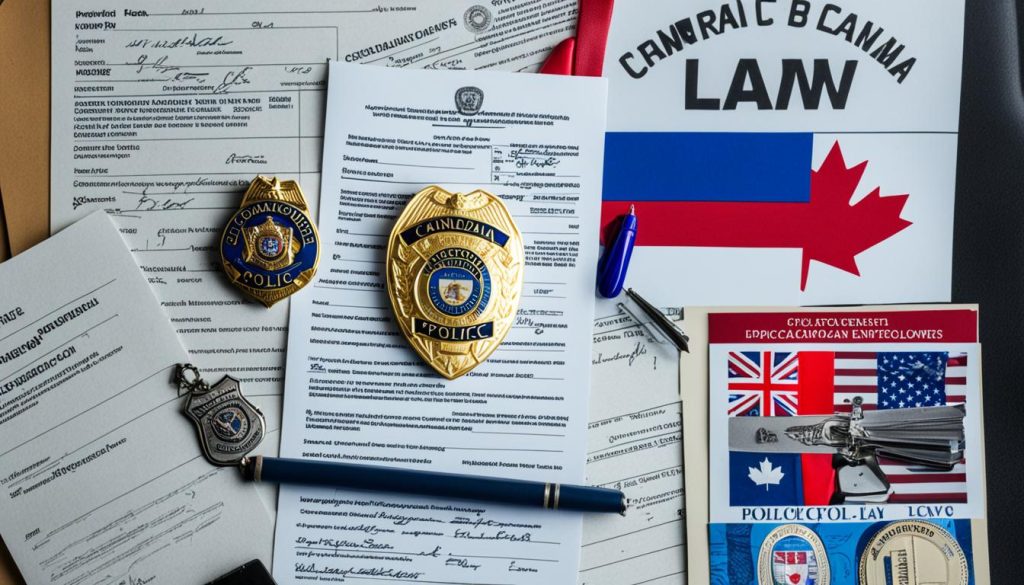Are you interested in becoming a law enforcement officer in Ontario? If so, you’ve come to the right place. In this career guide, we will walk you through the process of how to become a police officer in Ontario. From the police entrance exam to the necessary qualifications and training, we have all the information you need to kickstart your journey towards a rewarding career in law enforcement. Whether you have just graduated high school or are looking to switch careers, this guide will provide you with valuable insights and resources to help you achieve your goal. So, let’s dive in and explore the path to becoming a police officer in Ontario!
Job Outlook for Ontario Police Officers
As of 2021, Canada had 81,100 police officers, with Ontario showing significant employment figures. The projected demand for police officers remains one of “balanced opportunity,” suggesting parity between job openings and seekers. Over the next three years, job opportunities in various provinces, including Ontario, are expected to be moderate to good. Specifically, regions like Toronto and Ottawa show a promising outlook with expected openings between 4,001 – 5,000, driven by retirements and the creation of new positions.

From 2022 to 2031, it is projected that there will be 38,900 new job openings for police officers across Canada, with approximately 36,300 new job seekers ready to fill these positions. Labour market conditions indicate a balance between supply and demand, reflecting the steady need for qualified law enforcement professionals. This balance was observed from 2019-2021 and is expected to continue through 2031.
The Ontario Provincial Police (OPP) offers robust employment and volunteer opportunities, encouraging applications from diverse communities, including Indigenous Peoples, persons with disabilities, women, racialized groups, 2SLGBTQ+ persons, and those fluent in various languages. These opportunities exist not only for sworn officers but also in various civilian roles crucial for operational support, such as communications, administration, forensics, and IT.
The OPP Cadet Program is particularly notable for future police constable candidates, enhancing their career development by supporting frontline officers and engaging in community safety initiatives. Additionally, Special Constables, who are civilian employees with limited police powers, handle specific duties such as offender transport, court-related tasks, and forensic analysis.
Police officer qualifications in Ontario are stringent, ensuring that only the most capable individuals enter the force. These requirements, alongside the promising job outlook, make a career in policing both a stable and rewarding option for those pursuing law enforcement careers Ontario-wide.
Minimum Requirements to Apply
The road to wearing the badge begins with satisfying a series of minimum criteria. Meeting these fundamental police academy requirements ensures that applicants are prepared to uphold the highest standards of service and integrity.
1. Age, Citizenship, and Education
Applicants must be at least 18 years of age, Canadian citizens, or permanent residents with police officer qualifications Ontario. A valid Canadian high school diploma or its equivalent is required. Beyond these, different police agencies impose additional criteria. For instance, the RCMP requires permanent residents to have lived in Canada for the last 10 years. The Calgary Police Service demands three years of residency in Canada or the USA for non-citizen applicants. Toronto Police Service and Vancouver Police Department (VPD) also mandate specific additional requirements.

| Police Agency | Additional Requirements |
|---|---|
| RCMP | Permanent residents must have lived in Canada for the last 10 years |
| VPD | BC Class 5 driver’s licence, good driving record, 30 academic post-secondary credits |
| Calgary Police Service | Three years of residency in Canada or USA, CPR and first aid certification, bankruptcy discharge conditions |
| Toronto Police Service | Valid driver’s licence with minimal demerit points, CPR and first aid certifications |
2. Health and Character Standards
Health and character standards play a significant role in building a dependable police force. Police academy requirements also highlight the necessity for excellent health and impeccable character. A clean criminal record is mandatory, and applicants should hold a driving license with minimal demerit points. Psychological and medical assessments, alongside a thorough background check, ensure that applicants meet the police officer qualifications Ontario demands.
The fundamental rationale behind these requirements is to ensure that those who serve are capable and of unimpeachable character, fit to withstand the rigours of the job, and uphold the law impartially. Individuals who aspire to be police officers must meet these stringent standards to be considered for this esteemed profession.
Steps to Become a Cop in Ontario
Becoming a police officer in Ontario involves a series of well-defined steps designed to ensure candidates are fully prepared for the demands of the job. Below, we break down the steps to become a cop in Ontario, highlighting key requirements and processes.

1. Ontario Association of Chiefs of Police (OACP) Certificate
The first step in your journey is to obtain the OACP certificate, a vital prerequisite in the hiring process for police officers Ontario. This certificate is a testament to your eligibility and readiness for a career in law enforcement. To acquire it, candidates must successfully pass a series of examinations and assessments that test their cognitive and physical abilities.
2. Fitness and Medical Assessments
Next, candidates must undergo rigorous fitness and medical assessments. A key component is the PREP (Physical Readiness Evaluation for Police), a challenging fitness test with a certificate valid for only 6 months from the date of issuance. Additionally, candidates proceeding to the medical assessment stage must meet specific vision and hearing standards, ensuring that all physical requirements are met.
For experienced officer applicants, a valid Emergency First Aid with level C CPR certification and a valid fitness test are mandatory. These assessments guarantee that aspiring officers can meet the physical demands of the job.
3. Application and Interview Process
The final stage in the steps to become a cop in Ontario involves a detailed application and interview process. This includes completing a comprehensive background check, primary and secondary interviews, and a psychological assessment consisting of a written questionnaire followed by an interview with a contracted psychologist. This step ensures that candidates possess the mental and emotional resilience needed for the job.
Additionally, accommodations may be provided throughout the hiring process, making it accessible for all candidates. Different police services, such as the Ottawa Police Service, conduct recruitment up to four times a year, offering multiple opportunities for aspiring officers. As candidates advance, they can expect a probationary salary of $85,392, which increases as they progress through the ranks.
| Rank | Salary |
|---|---|
| Probationary Constable | $85,392 |
| 4th Class Constable (after one year) | $91,500 |
| 3rd Class Constable (after two years) | $97,596 |
| 2nd Class Constable (after three years) | $109,788 |
| 1st Class Constable (after four years) | $121,992 |
Police Training in Ontario
Once a candidate has successfully passed the application stages, police training in Ontario begins. The training is pivotal in shaping recruits into competent officers who will uphold the law and ensure public safety. The key institutions responsible for this training are the Ontario Police College and the Provincial Police Academy.
1. Ontario Police College
The Ontario Police College is an essential hub for police training in Ontario. Its programs are geared to provide recruits with intensive and comprehensive education, covering critical areas such as crisis intervention, de-escalation techniques, and community relations. Each program at the Ontario Police College typically spans 16 to 24 months, with start dates scheduled between September 2024 and August 2025.

2. Provincial Police Academy
The Provincial Police Academy plays a significant role in preparing new recruits and experienced officers alike. The Ontario Provincial Police (OPP) offers services to over 320 communities and hires more than 540 constables annually. Training at the Provincial Police Academy is comprehensive, with no tuition fees for recruits, highlighting the province’s commitment to developing well-rounded law enforcement officers. Various program delivery types include block-based, course-based, condensed week, online, twilight, and twilight-online formats, ensuring flexibility and accommodating diverse learning preferences.
How to Become a Police Officer in Ontario?
Understanding how to become a police officer in Ontario goes beyond meeting the basic requirements. Aspiring officers should focus on continuous learning, maintaining a positive work history, and demonstrating leadership potential. Let’s delve into the preparation and specific application processes for different police agencies in Ontario.
1. Preparing for the Career
To succeed in the hiring process for police officers in Ontario, candidates must engage in rigorous preparation:
- Ensure you meet the minimum age requirement of 18 years at the time of application.
- Participate actively in community services, which helps in building a good rapport and leadership skills.
- Maintain a clean and admirable personal record, which will be beneficial during the background investigation stage.
- Engage in continuous physical fitness to meet the in-house fitness test requirements.
- Attend preparatory workshops and events hosted by various police agencies.
2. Application Process for Different Police Agencies
While the core elements of the hiring process for police officers Ontario remain similar, there are specific nuances for different agencies:
- Primary and Secondary Interviews: Candidates undergo initial and follow-up interviews with experienced officers to assess their suitability.
- Post-Interview Testing: This includes psychological assessments, in-house fitness tests, third-party medical examinations, and driving evaluations.
- Comprehensive Background Investigation: A thorough check involving employment, educational history, credit checks, police record checks, and even a home visit.
Different agencies like the Ontario Provincial Police (OPP), Toronto Police Service, and Ottawa Police Service may have distinct procedures but share the goal of finding dedicated and accountable candidates:
| Agency | Unique Processes |
|---|---|
| Ontario Provincial Police (OPP) | Frequently hosts recruitment events, promotes volunteer opportunities, and emphasizes accessibility and diversity. |
| Toronto Police Service | Offers competitive salaries and comprehensive benefits, including family medical and dental benefits. |
| Ottawa Police Service | Includes education reimbursement programs and long-term disability insurance as part of their benefits package. |
By understanding the unique hiring process for police officers Ontario, candidates can better prepare and increase their chances of securing a position in their desired police agency.
Why Choose a Career in Policing?
Choosing a career in policing is more than a job—it’s a calling that offers many advantages, from professional growth to personal fulfillment. In Ontario, law enforcement careers provide a unique opportunity to contribute to public safety while enjoying numerous benefits and pathways for career development.
1. Career Growth and Opportunities
The landscape of law enforcement careers in Ontario has evolved significantly. Today, individuals in their thirties and older are also entering the field, bringing with them a wealth of maturity and wisdom. This shift reflects a broader societal trend where people undertake multiple careers in their lifetime. The Ontario Provincial Police (OPP) and other agencies emphasize continuous learning and leadership development, ensuring that officers can advance their careers over time.
Community policing remains a cornerstone of law enforcement in Ontario, fostering strong relationships between police officers and the communities they serve. This approach not only enhances public trust but also provides officers with a deeply rewarding experience. Furthermore, modern recruit training programs focus on mental health and resilience, equipping officers to handle the various challenges they may face in their careers.
2. Personal and Professional Fulfillment
Law enforcement careers in Ontario are known for providing a high degree of personal satisfaction. Policing is a profession that offers the chance to make a tangible difference in people’s lives. Officers can retire with a sense of accomplishment, knowing they’ve contributed to a safer society. Changes in societal norms have also led to discussions around redefining retirement for police officers, considering them “retired” rather than resigned when they leave the force.
Recognizing the emotional and physical toll of policing, there is now a greater emphasis on supporting officers’ well-being throughout and after their careers. The salary package is also competitive, with the average salary for police officers in Ontario being commendable. As of 2016, officers with a high school diploma earned an average annual income of $106,788, compared to $106,543 for those with a bachelor’s degree.
Overall, law enforcement careers in Ontario offer not just a stable and rewarding professional path, but also the chance to significantly impact the community positively. Whether you are just starting out or looking to pivot your career later in life, policing can be a fulfilling way to serve and protect.
Police Officer Salaries and Benefits in Ontario
The appeal of becoming a police officer in Ontario is significantly enhanced by the promising compensation and benefits offered. With a comprehensive remuneration package, Ontario policing recognizes the importance of financial stability and work-life balance for its officers. The average annual police officer salary in Ontario stands at an impressive $106,788 for those with a high school diploma, closely mirroring those with a bachelor’s degree at $106,543. Such figures underscore the province’s dedication to providing competitive police officer salaries in Ontario.
The benefits of policing Ontario extend well beyond these salaries. Officers enjoy paid vacations, extensive family medical and dental benefits, life insurance, and pension plans. These benefits emphasize not only the financial but also the overall well-being of the officers, ensuring they and their families are well-supported.
The starting salary at Toronto Police Service is $70,643.30 per year, with the potential to reach $100,923.48 by the fourth year. Comparatively, the Ottawa Police Service offers a starting salary of $67,615.92, which can climb to $99,434.93 by the fourth year. This structured salary system reflects a clear pathway for financial growth as one gains experience in the force.
The Ontario Provincial Police (OPP) offers attractive salaries, averaging around $100,500 annually. Both full-time Provincial Constables and Special Constables benefit from the comprehensive remuneration packages which include benefits coverage, pensions, and paid vacation. In addition, the OPP Cadet Program aids in developing future police constables, further enhancing career development opportunities within the force.
Additionally, the labour market conditions for police officers in Ontario are currently rated as “Average,” with job openings primarily concentrated in Toronto and Ottawa. Expected job openings from 2017 to 2021 range between 4,001 to 5,000 positions, making it a stable career choice for aspiring candidates.
Overall, the police officer salaries Ontario and the benefits of policing Ontario collectively demonstrate the province’s commitment to attracting and retaining dedicated law enforcement personnel. This holistic support system ensures that officers not only thrive in their careers but also enjoy a quality life, both on and off duty.
| Region | Starting Salary | Fourth-Year Salary | Median Income (2015) |
|---|---|---|---|
| Toronto | $70,643.30 | $100,923.48 | $107,627 |
| Ottawa | $67,615.92 | $99,434.93 | $105,533 |
| Hamilton | $63,622 | $104,715 | $106,485 |
Conclusion
Embarking on the journey to becoming a law enforcement officer in Ontario is both challenging and rewarding. From meeting the stringent entry requirements to undergoing extensive training at places like the Ontario Police College, each step is meticulously designed to prepare candidates for a distinguished career in policing. Successful completion of the program, which includes multiple written and practical exams, ensures that recruits are well-equipped to safeguard the community.
The rigorous steps to become a cop in Ontario include obtaining the Ontario Association of Chiefs of Police (OACP) Certificate, passing fitness and medical assessments, and navigating through a comprehensive application and interview process. The variability in training duration – from a 21-week average to more extensive 39-week programs like those at the Justice Institute of BC – highlights the diversity and thoroughness of police education across Canada.
As the field continues to evolve with advancements in technology, such as e-learning and simulations, and improved collaboration among training experts, the future of policing education holds promise. For those driven by a sense of duty and the desire for community service, becoming a police officer in Ontario offers a fulfilling career with opportunities for growth. A clear understanding of the current landscape paired with a commitment to innovate and excel ensures that all efforts culminate in a truly impactful profession.
FAQ
1. What are the minimum requirements to become a police officer in Ontario?
To become a police officer in Ontario, you must be at least 18 years old, a Canadian citizen or permanent resident, fluent in English, and hold a valid Canadian high school diploma or equivalent. A clear criminal record, excellent health, a good driving record, and a valid driver’s license with minimal demerit points are also required.
2. How is the job market for police officers in Ontario?
The labour market for police officers in Ontario is currently rated as Average with a balance between job openings and seekers. Regions like Toronto and Ottawa are expected to have higher opportunities due to retirements and the creation of new positions.
3. What is the OACP Certificate and why is it important?
The OACP (Ontario Association of Chiefs of Police) Certificate is essential for aspiring police officers. It validates your qualifications and readiness for a career in law enforcement, covering a series of tests including fitness, psychological assessments, and background checks.
4. What kind of training do police officers receive in Ontario?
In Ontario, police officers receive training at institutions like the Ontario Police College and the Provincial Police Academy. Training includes crisis intervention, de-escalation techniques, law enforcement, and public safety protocols.
5. What does the application process involve for different police agencies in Ontario?
The application process can vary between different agencies such as the Ontario Provincial Police (OPP) and the Toronto Police Service. Generally, it includes submitting an application, passing the OACP Certificate tests, interviews, psychological assessments, and background checks.
6. What are the health and character standards required for becoming a police officer?
Applicants must be in excellent health, have a clear criminal record, and meet character standards that ensure they can uphold the law impartially and withstand the job’s rigors. A good driving record is also crucial.
7. What are the benefits of a career in policing in Ontario?
Benefits include competitive salaries exceeding $100,000 annually, paid vacations, comprehensive family medical coverage, life insurance, pension plans, and supportive leave policies. There are also opportunities for career growth and personal fulfillment.
8. What kind of physical and medical assessments are required?
Physical and medical assessments are required to ensure that candidates have the physical capabilities needed for the job. These assessments validate your health status and physical fitness.




